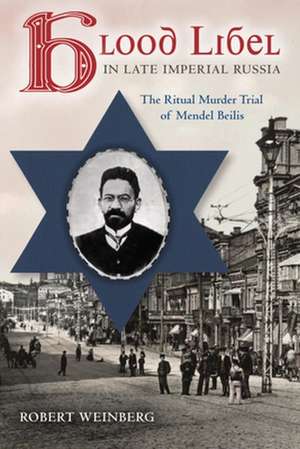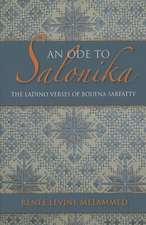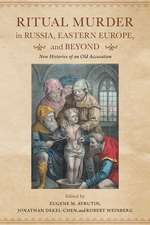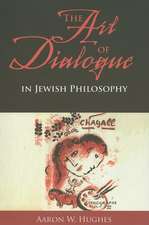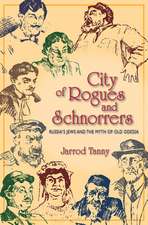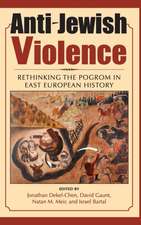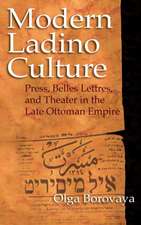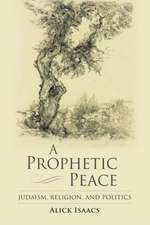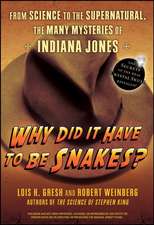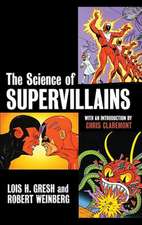Blood Libel in Late Imperial Russia – The Ritual Murder Trial of Mendel Beilis
Autor Robert Weinbergen Limba Engleză Paperback – 19 noi 2013
| Toate formatele și edițiile | Preț | Express |
|---|---|---|
| Paperback (1) | 189.01 lei 6-8 săpt. | |
| MH – Indiana University Press – 19 noi 2013 | 189.01 lei 6-8 săpt. | |
| Hardback (1) | 540.63 lei 6-8 săpt. | |
| MH – Indiana University Press – 19 noi 2013 | 540.63 lei 6-8 săpt. |
Preț: 189.01 lei
Nou
Puncte Express: 284
Preț estimativ în valută:
36.17€ • 37.76$ • 29.93£
36.17€ • 37.76$ • 29.93£
Carte tipărită la comandă
Livrare economică 04-18 aprilie
Preluare comenzi: 021 569.72.76
Specificații
ISBN-13: 9780253011077
ISBN-10: 0253011078
Pagini: 200
Ilustrații: 19 b&w illustrations, 2 maps
Dimensiuni: 151 x 227 x 16 mm
Greutate: 0.28 kg
Editura: MH – Indiana University Press
ISBN-10: 0253011078
Pagini: 200
Ilustrații: 19 b&w illustrations, 2 maps
Dimensiuni: 151 x 227 x 16 mm
Greutate: 0.28 kg
Editura: MH – Indiana University Press
Cuprins
AcknowledgmentsDramatis PersonaeIntroduction: A Murder Without a Mystery1. The Initial Investigation2. The Case Against Beilis3. The Trial4. Summation and VerdictEpilogueDocumentsBibliographyNotesIndex
Recenzii
"A concise historical reconstruction of one of the most publicized and notorious ritual murder trials in the modern world. Written in a clear and engaging style, the book analyzes a wide array of archival and published primary documents... all of which help capture the drama and complexity of the Beilis case." Eugene M. Avrutin, author of Jews and the Imperial State: Identification Politics in Tsarist Russia "Lucidly written, well argued, and rich with primary source material... the story unfolds like a gripping detective novel.... It is social history at its finest." Jarrod Tanny, author of City of Rogues and Schnorrers: Russia's Jews and the Myth of Old Odessa (IUP, 2011)
"A concise historical reconstruction of one of the most publicized and notorious ritual murder trials in the modern world. Written in a clear and engaging style, the book analyzes a wide array of archival and published primary documents... all of which help capture the drama and complexity of the Beilis case." - Eugene M. Avrutin, author of Jews and the Imperial State: Identification Politics in Tsarist Russia "Lucidly written, well argued, and rich with primary source material... the story unfolds like a gripping detective novel... It is social history at its finest." - Jarrod Tanny, author of City of Rogues and Schnorrers: Russia's Jews and the Myth of Old Odessa (IUP, 2011)
"A concise historical reconstruction of one of the most publicized and notorious ritual murder trials in the modern world. Written in a clear and engaging style, the book analyzes a wide array of archival and published primary documents... all of which help capture the drama and complexity of the Beilis case." - Eugene M. Avrutin, author of Jews and the Imperial State: Identification Politics in Tsarist Russia "Lucidly written, well argued, and rich with primary source material... the story unfolds like a gripping detective novel... It is social history at its finest." - Jarrod Tanny, author of City of Rogues and Schnorrers: Russia's Jews and the Myth of Old Odessa (IUP, 2011)
Notă biografică
Robert Weinberg is Professor of History at Swarthmore College and author of The Revolution of 1905 in Odessa: Blood on the Steps (IUP, 1993) and Stalin's Forgotten Zion: Birobidzhan and the Making of a Soviet Jewish Homeland.
Descriere
Descriere de la o altă ediție sau format:
On Sunday, March 20, 1911, children playing in a cave near Kiev made a gruesome discovery: the blood-soaked body of a partially clad boy. After right-wing groups asserted that the killing was a ritual murder, the police, with no direct evidence, arrested Menachem Mendel Beilis, a 39-year-old Jewish manager at a factory near the site of the crime. Beilis's trial in 1913 quickly became an international cause celebre. The jury ultimately acquitted Beilis but held that the crime had the hallmarks of a ritual murder. Robert Weinberg's account of the Beilis Affair explores the reasons why the tsarist government framed Beilis, shedding light on the excesses of antisemitism in late Imperial Russia. Primary documents culled from the trial transcript, newspaper articles, Beilis's memoirs, and archival sources, many appearing in English for the first time, bring readers face to face with this notorious trial."
On Sunday, March 20, 1911, children playing in a cave near Kiev made a gruesome discovery: the blood-soaked body of a partially clad boy. After right-wing groups asserted that the killing was a ritual murder, the police, with no direct evidence, arrested Menachem Mendel Beilis, a 39-year-old Jewish manager at a factory near the site of the crime. Beilis's trial in 1913 quickly became an international cause celebre. The jury ultimately acquitted Beilis but held that the crime had the hallmarks of a ritual murder. Robert Weinberg's account of the Beilis Affair explores the reasons why the tsarist government framed Beilis, shedding light on the excesses of antisemitism in late Imperial Russia. Primary documents culled from the trial transcript, newspaper articles, Beilis's memoirs, and archival sources, many appearing in English for the first time, bring readers face to face with this notorious trial."
